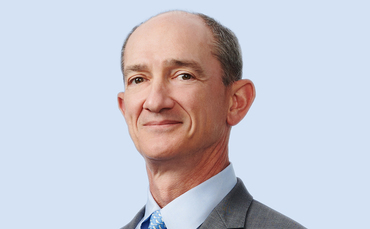According to Alec Cutler, manager of the Orbis Global Balanced fund, these same investors have shunned producer-type names boasting up to 25-30% free cash flow yields.
"There is just insane pricing and valuations on these companies," he said. "We are quite comfortable holding them and taking the near-term hit."
The multi-asset fund has returned 10.3% and 26.2% over one and three years respectively, outstripping its IA Mixed Investments 40-85% Shares sector, which has returned -5.4% and 9.6% over the same period.
Orbis Global Balanced remains underweight popular US growth stocks and overweight producers, instead counting iShares Physical Gold ETC, Samsung and energy companies such as Kinder Morgan, Shell and Schlumberger in its top holdings.
Partner insight: pricing power can be an inflation shield for equity investors
The contrarian remains broadly underweight the dollar, which Cutler said had been "tough" but justified as the cost of the currency soared.
While equities suffered under the weight of macroeconomic shocks and rising inflation, Cutler reduced the fund's net equity weighting and bought Treasury Inflation-Protected Securities in search of real yield, which he said had risen to 0.5% on a seven-year security.
"With inflation at 8.5%, we are getting a 9% yield on these things and they are not taxable. Those afraid of inflation typically look to consumer product companies which might yield 2.5% and somewhere around 1.8% after inflation and taxes."
Janus Henderson: Global dividends break Q1 record but uncertain outlook remains
Many consumer non-durables are suffering under margin compression and Cutler said he predicted many would either cut dividends or stunt dividend growth for years to come.
While markets are focused on the price of energy, with many expecting oil to crash, Cutler said it was necessary for the oil price to come down for inflation to taper materially, warning there was an additional phenomenon still largely being ignored by central banks.
"The big thing now is 'greenflation'. The whole ESG movement is driving every chemical and manufacturing plant to decarbonise. Changing processes will be very expensive. To rebuild a chemical facility you almost have to start from scratch. And when you are finished with the rebuild you are not making any more units. In fact, the units cost more to make."
Rathbone's Smith on stagflation and looming likelihood of recession
High costs, in combination with a productivity drought, is the definition of inflation, Cutler said.
"Energy companies are still using the same amount of inputs and expending a ton of energy to remove carbon. Because companies like Shell and BP still need to make the same profit margin on it, they need to charge more. That is inflation."
The fund does not own companies that will be required to make these adjustments without the security of knowing they will be able to pass on costs, focusing instead on stocks that facilitate the processes.


